10 Signs You’re in a Codependent Relationship

Finding the right balance in a relationship can be so rewarding. On the other hand, romantic partnerships can easily be thrown off by any number of underlying issues, including codependency. Closeness with your significant other is generally a good thing, so how can you know if what you have is a problem? To help you understand the true nature of codependency and how it can affect your relationship, we turned to several therapists and other experts for their insights. Read on for 10 signs you’re in a codependent relationship.
RELATED: What Is Love Bombing? 8 Signs Your Partner Is Doing It to You.
What is a codependent relationship?
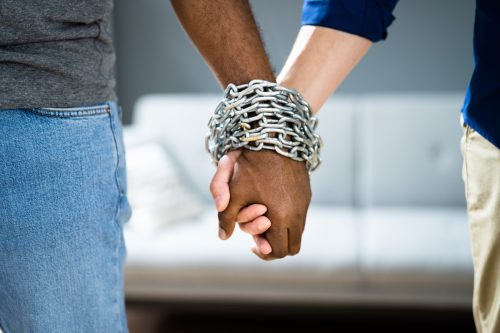
Before you can recognize the signs of a codependent relationship, it’s important to understand exactly what that means.
“A codependent relationship is one where one or both partners are excessively reliant on the other for approval, a sense of identity, and emotional support,” Rachel Goldberg, LMFT, psychotherapist and founder of Rachel Goldberg Therapy, tells Best Life.
Codependency in a relationship is like a “tangled web,” Paul Losoff, PsyD, clinical psychologist with Bedrock Psychology Group, adds.
“There is a lack of boundaries, with one or both partners sacrificing their sense of identity and independence,” he explains.
It can also lead to an “unhealthy imbalance where one person becomes the primary caregiver and the other the care receiver, creating a cycle of dependency,” trauma therapist Becca Reed, LCSW, shares.
What are the dangers of being in a codependent relationship?
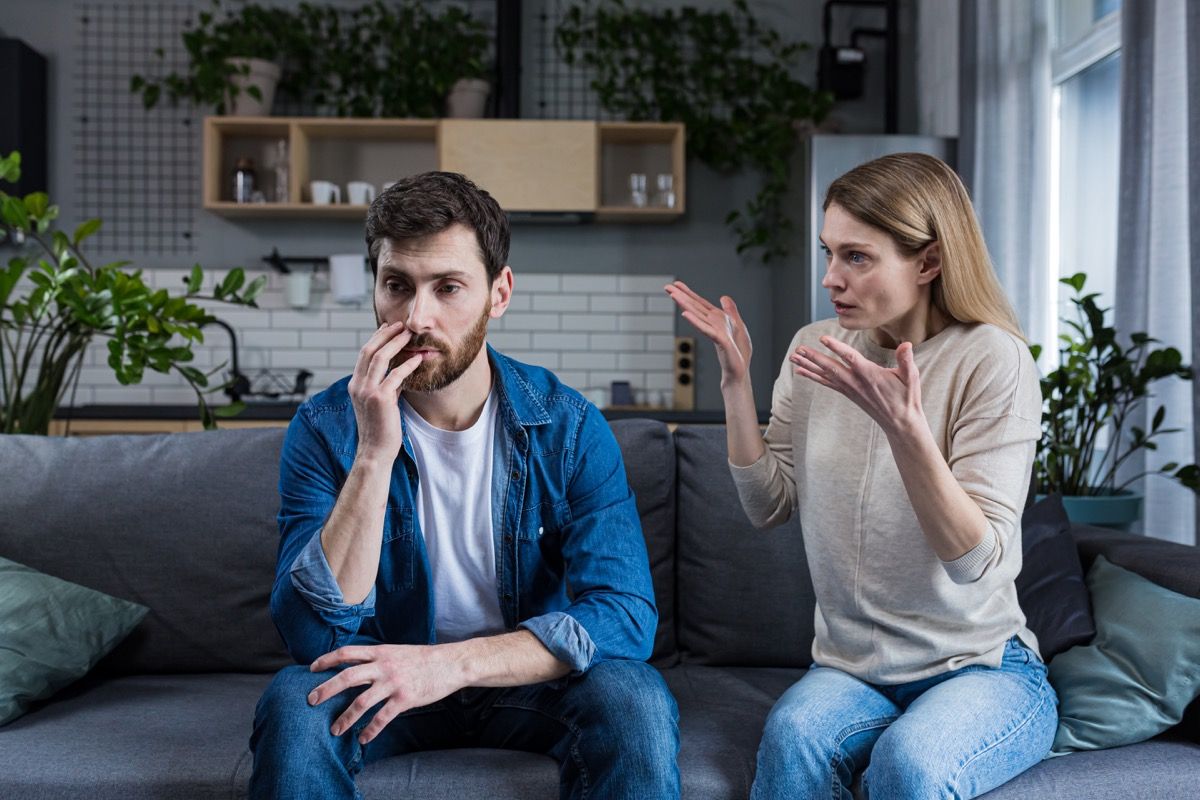
When it comes to how codependency can negatively impact a relationship, mental health expert Natalie Rosado, LMHC, says the “dangers are numerous and can significantly impact both individuals involved.”
One of the biggest risks is the possibility for codependent relationships to escalate into emotionally or physically abusive situations, according to Rosado.
“The ‘caretaker’s’ attempts to maintain control and the dependent partner’s manipulative behaviors can create a toxic and dangerous environment,” she notes.
This dynamic can also result in a loss of individual identity, emotional exhaustion, resentment and frustration, difficulty leaving the relationship, and lack of personal growth.
“Both individuals in a codependent relationship may experience stunted personal growth,” Rosado warns. “The caretaker’s focus on their partner inhibits their ability to pursue personal goals and aspirations, while the dependent partner avoids developing self-reliance and accountability.”
Codependency doesn’t mean your relationship is doomed. In fact, you can work to build a healthier relationship that “involves both partners working together towards mutual growth and emotional well-being,” Reed assures.
But before you can try to heal, you must first recognize the signs of a codependent relationship. Here are the 10 warning signs to be on the lookout for.
RELATED: 10 Dating Red Flags You Should Never Ignore, Therapists Warn.
1
One person is always the center of attention.
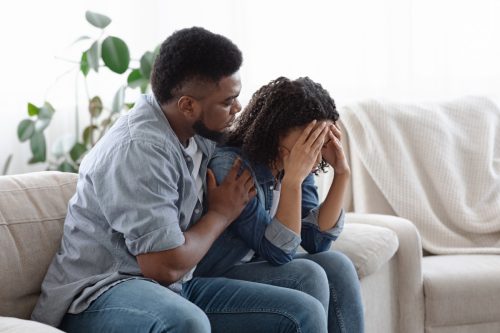
A major red flag of codependency is that one person’s emotional needs regularly require more attention than the other’s.
“In healthy relationships, there is a balance of give and take,” explains Kara Nassour, licensed professional counselor at Shaded Bough Counseling. “There might be days where one person is the center of attention or support, but they will give that to their partner sometimes, too. In a codependent relationship, the person who’s the center of attention and support is almost always in that role.”
2
You’re always fixated on your partner’s problems.
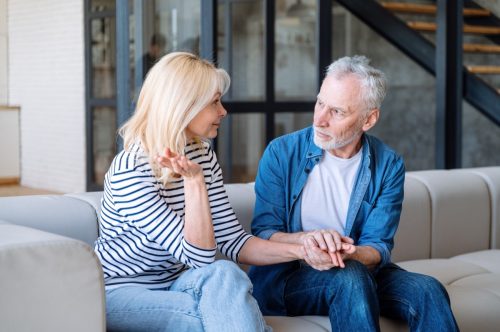
On the other hand, the person who’s giving that attention and support might not always get their needs met. In a codependent relationship, one partner may find themselves fixated on the other person’s problems—so much so that they are “preoccupied with their partner’s issues all the time and feel responsible for solving them,”says Gary Tucker, licensed psychotherapist at D’Amore Mental Health.
“This hampers their ability to take accountability or develop independent problem-solving skills,” he cautions.
3
You become anxious when your partner is gone.
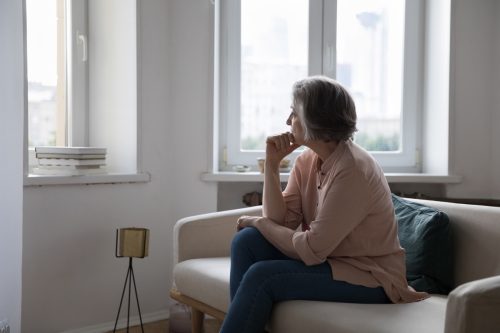
In healthy relationships, each person should be able to occupy themselves when the other is away, whether that’s for a few hours or a few days. If anxiety sets in, it could be a sign of codependency.
“Anxiety symptoms can include difficulty sleeping, overeating, overuse of technology and screens, substance use, or other behaviors that either distract someone from their feelings or provide superficial relief,” says David Helfand, PsyD, a licensed psychologist specializing in couples therapy. “If you feel anxious when your partner is away, that could be a sign that you are dependent on them for your well-being.”
Some anxiety is okay, he clarifies.
“Perhaps your partner is visiting their estranged parent and you feel empathy,” Helfand says. “It’s normal to have a slightly anxious reaction, in this case.”
However, you should be able to self-soothe within a reasonable period of time. If you can’t, you may be dependent on your partner for that calming effect.
RELATED: “Breadcrumbing” Is a Toxic Dating Trend on the Rise—How to Spot It in Your Relationship.
4
You do everything together.

Spending every second together is the opposite of healthy.
“A very easily overlooked red flag that someone in the relationship is codependent is if they do everything together,” saus Desiree Taranto, LMHC, licensed therapist with Empower Your Mind Therapy in New York. “Their interests start to mesh, and it is almost like they become one person.”
Intertwining your lives in key ways is important—but your partner should not become your whole life.
“You should not lose friends, ignore family, or not do the things that interested you prior to the relationship. In doing so, you are losing your identity and if/when the relationship ends, it could be hard to find who you are again,” Taranto warns.
5
You can’t make decisions without the other person’s input.
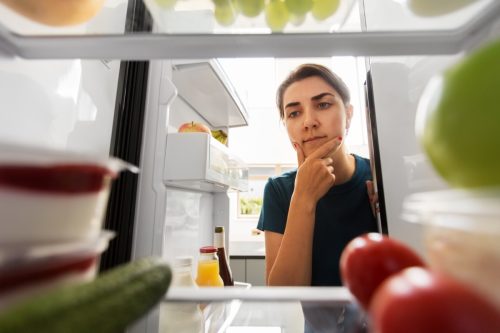
In a codependent relationship, your sense of self-worth is usually tied to the other person’s approval. As a result, you may “find it challenging to make any decisions without their input,” according to Carolina Estevez, PsyD, a licensed psychologist with Crestone Wellness.
“This could be as simple as choosing what to eat for dinner or as significant as making career choices,” she explains.
6
You struggle to communicate honestly.

Genuine communication is essential in any relationship.
“Codependents are often afraid to share their true feelings and thoughts, especially if they feel like they will be judged or rejected by the other person,” says Colleen Wenner, LMHC, therapist at New Heights Counseling & Consulting. “This can lead to an unhealthy dynamic where both partners are constantly trying to please each other and unable to express themselves honestly.”
This lack of communication could lead to the inability to meet each other’s needs and desires. The codependent person could also be pressured to change into what the other person wants.
“This only makes things worse,” Wenner notes.
RELATED: I’m a Relationship Expert and These Are the 5 Biggest Signs of a Needy Partner.
7
You find it hard to say no.
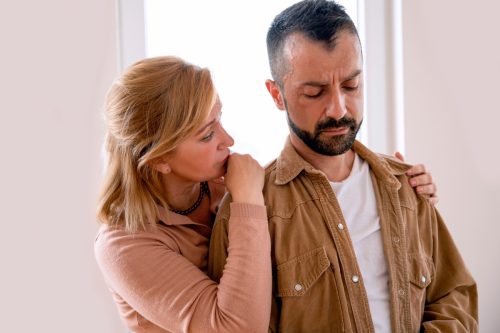
You’re not always going to agree with everything in your relationship. Compromise is important, but if you’re finding it hard to say “no” even when you want to, you could be in a codependent relationship.
“There is a tendency to back down when upset and let the partner’s needs and emotions come before their own,” Goldberg shares. “Without healthy and clear boundaries, this leads to enmeshment, lack of respect, and eventually resentment, loss of self, and constant overwhelm.”
8
Breaking up is your worst fear.
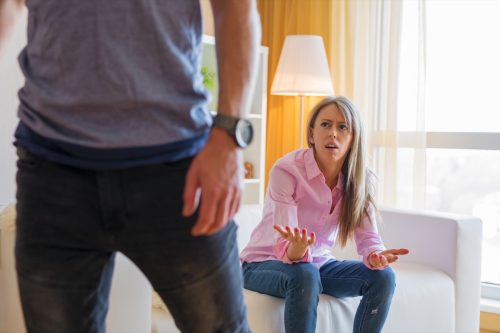
No matter how good it is, your relationship shouldn’t be your only priority in life.
“If one person is expressing that the relationship is their everything and they need it to survive, that is a huge red flag,” Taranto cautions. “This is a sign of codependency because the person expressing this is most likely lacking self-esteem and is using their relationship as a way to feel whole.”
As Taranto notes, you should go into each partnership as a whole person.
“Another way this shows codependency is if the other person in the relationship is aware of the feelings of the codependent partner, this can make the relationship feel like a burden,” she points out. “It can feel very heavy, and that person can live in fear of breaking up with the other person, not knowing what they would do if the relationship ended.”
9
You feel guilty for taking time for yourself.

Another huge part of maintaining your stance as a whole person in a relationship is taking time for yourself. But this can be hard to do when codependency is wreaking havoc, Estevez says.
“In a codependent relationship, alone time or self-care can seem selfish because it means taking time away from your partner,” she explains. “You might feel guilty for taking care of your own needs instead of constantly focusing on theirs.”
RELATED: The 5 Love Languages and How They Can Help You Communicate.
10
You’re always looking for reassurance.

It’s good to know you’re loved. But if there is a constant need for reassurance present, it could be a sign of a codependent relationship, according to Goldberg.
“This could mean asking for reassurance verbally, seeking it through physical intimacy, or checking the partner’s phone,” she says. “This compromises self-esteem and can destroy trust in the relationship.”
This story has been updated to include additional entries, fact-checking, and copy-editing.